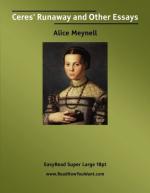But even the naughty child is an individual, and must not be treated in the mass. He is numerous indeed, but not general, and to describe him you must take the unit, with all his incidents and his organic qualities as they are. Take then, for instance, one naughty child in the reality of his life. He is but six years old, slender and masculine, and not wronged by long hair, curls, or effeminate dress. His face is delicate and too often haggard with tears of penitence that Justice herself would be glad to spare him. Some beauty he has, and his mouth especially is so lovely as to seem not only angelic but itself an angel. He has absolutely no self-control and his passions find him without defence. They come upon him in the midst of his usual brilliant gaiety and cut short the frolic comedy of his fine spirits.
Then for a wild hour he is the enemy of the laws. If you imprison him, you may hear his resounding voice as he takes a running kick at the door, shouting his justification in unconquerable rage. “I’m good now!” is made as emphatic as a shot by the blow of his heel upon the panel. But if the moment of forgiveness is deferred, in the hope of a more promising repentance, it is only too likely that he will betake himself to a hostile silence and use all the revenge yet known to his imagination. “Darling mother, open the door!” cries his touching voice at last; but if the answer should be “I must leave you for a short time, for punishment,” the storm suddenly thunders again. “There (crash!) I have broken a plate, and I’m glad it is broken into such little pieces that you can’t mend it. I’m going to break the ’lectric light.” When things are at this pass there is one way, and only one, to bring the child to an overwhelming change of mind; but it is a way that would be cruel, used more than twice or thrice in his whole career of tempest and defiance. This is to let him see that his mother is troubled. “Oh, don’t cry! Oh, don’t be sad!” he roars, unable still to deal with his own passionate anger, which is still dealing with him. With his kicks of rage he suddenly mingles a dance of apprehension lest his mother should have tears in her eyes. Even while he is still explicitly impenitent and defiant he tries to pull her round to the light that he may see her face. It is but a moment before the other passion of remorse comes to make havoc of the helpless child, and the first passion of anger is quelled outright.
Only to a trivial eye is there nothing tragic in the sight of these great passions within the small frame, the small will, and, in a word, the small nature. When a large and sombre fate befalls a little nature, and the stage is too narrow for the action of a tragedy, the disproportion has sometimes made a mute and unexpressed history of actual life or sometimes a famous book; it is the manifest core of George Eliot’s story of Adam Bede, where the suffering of Hetty is, as it were, the eye of the storm. All is expressive




